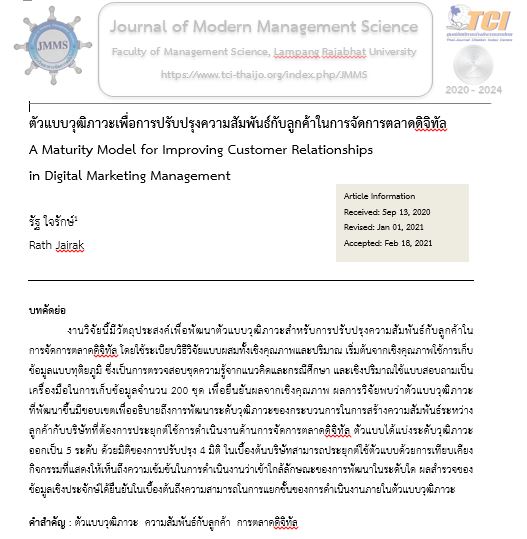Thai A Maturity Model for Improving Customer Relationships in Digital Marketing Management
Main Article Content
Abstract
This research aims to develop a maturity model for improving customer relationships in digital marketing management by using a mixed qualitative and quantitative research methodology. The process started with a qualitative method by examining a set of conceptual knowledge and case studies; then performed quantitative studies that use questionnaires to collect 200 sets of data to confirm the qualitative method's results. The findings show that the proposed model has the scope to explain the improving process of building relationships between customers and companies seeking to apply in digital marketing management. Maturity levels of the proposed model are defined by five levels, with four improving dimensions. Initially, the company can use the model by comparing the activity that demonstrates the operational concentration of how it closes to the nature of improvement in each maturity level. The empirical data also initially confirmed the ability to classify operations within the model.
Article Details
The article must be considered and accepted for publication by the editorial board of the Faculty of Management Science, Lampang Rajabhat University. The articles have been reviewed by a peer (peer review) and the author must update according to the suggestion if available before publication. Articles that are not considered the editorial team will inform the results of the consideration but will not send the original to the author.
JMMS is the Faculty of Management Science journal, Lampang Rajabhat University. Jmms published both print and online editions. We allow the use of articles for academic use under the scope of copyright law.
References
กุลฑลี รื่นรมย์. (2561). การกำหนดปัญหางานวิจัยด้านการตลาดดิจิทัลสำหรับประเทศไทยในอนาคต. จุฬาลงกรณ์ธุรกิจปริทัศน์, 40(157), 100-139.
Curtis, B., Hefley, W. E., & Miller, S. A. (2009). People CMM: A Framework for Human Capital Management. Pearson Education.
De Bruin, T., Rosemann, M., Freeze, R., & Kaulkarni, U. (2005). Understanding the Main Phases of Developing a Maturity Assessment Model. In Australasian Conference on Information Systems (ACIS). Australasian Chapter of the Association for Information Systems, 8-19.
Deiss, R., & Henneberry, R. (2017). Digital Marketing for Dummies. John Wiley & Sons.
Gartner Website. (2014). Digital Commerce. [Online]. Available from: https://www.gartner.com/it-glossary/digital-commerce. [accessed Mar 3, 2018].
Jairak, R., & Praneetpolgrang, P. (2011). The Development of a New Capability Maturity Model for Assessing Trust in B2C E-commerce Services. In International Conference on Informatics Engineering and Information Science, Springer, Berlin, Heidelberg, 448-462.
Jussila, J. J., Kärkkäinen, H., & Lyytikkä, J. (2011). Towards Maturity Modeling Approach for Social Media Adoption in Innovation. In 4th International Society of Professional Innovation Management Symposium, 1-14.
Kotler, P., Kartajaya, H., & Setiawan, I. (2016). Marketing 4.0: Moving from Traditional to Digital. John Wiley & Sons.
Marshall, S., & Mitchell, G. (2002). An E-learning Maturity Model. In Proceedings of the 19th Annual Conference of the Australian Society for Computers in Learning in Tertiary Education, Auckland, New Zealand, 8-11.
Paulk, M. C., Curtis, B., Chrissis, M. B., & Weber, C. V. (1993). Capability Maturity Model, version 1.1 IEEE software, 10(4), 18-27.
Pöppelbuß, J., & Röglinger, M. (2011). What Makes a Useful Maturity Model? A Framework of General Design Principles for Maturity Models and Its Demonstration in Business Process Management. In 19th European Conference on Information Systems (ECIS 2011), Helsinki.
Röglinger, M., Pöppelbuß, J., & Becker, J. (2012). Maturity Models in Business Process Management. Business process management journal, 18(2), 328-346.
Ryan, D. (2017). Digital Marketing: Marketing Strategies for Engaging the Digital Generation, 4th Edition. London and Philedelphia: Kogan Page Ltd.
Soares, S. (2010). The IBM Data Governance Unified Process: Driving Business Value with IBM Software and Best Practices. MC Press, LLC.
Sukrat, S., & Papasratorn, B. (2018). A Maturity Model for C2C Social Commerce Business Model. International Journal of Electronic Commerce Studies, 9(1), 27-54.
Swilley, E. (2016). Mobile Commerce: How It Contrasts, Challenges, and Enhances Electronic Commerce. Business Expert Press.
Triandini, E., Djunaidy, A., & Siahaan, D. (2017). Mapping Requirements into E-commerce Adoption Level: A Case Study Indonesia SMEs. In 2017 5th International Conference on Cyber and IT Service Management (CITSM). IEEE, 1-5.
Zahay, D. (2015). Digital Marketing Management: A Handbook for the Current (or Future) CEO. Business Expert Press.


